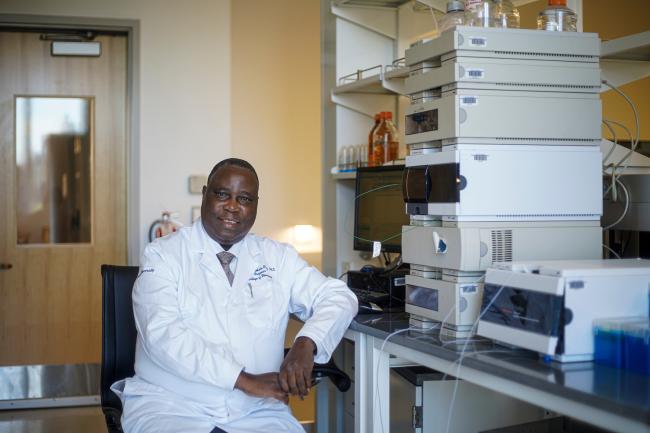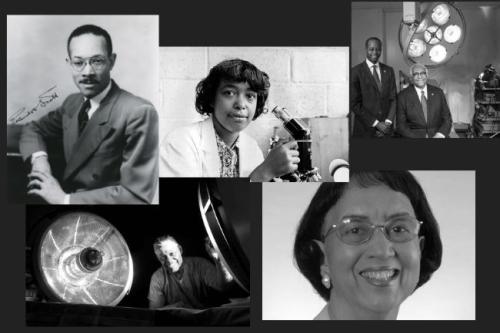WASHINGTON – Emmanuel O. Akala, Ph.D., professor in the Howard University College of Pharmacy, has been awarded $1.3 million in grants by the National Institutes of Health (NIH) to study complex drug therapy problems related to battling two diseases that disproportionately impact African Americans: triple-negative breast cancer and HIV/AIDS.
Akala is the director of the College of Pharmacy’s Laboratory for Nanomedicine, Drug Delivery, and Pharmaceutical and Biopharmaceutical Drug Products Design and Development. He also directs of the Center for Drug Research and Development in the college and teaches Pharm.D. and Ph.D. courses in pharmaceutical sciences. Akala has taught at Howard University for 25 years.
“We are very excited to receive support from the NIH,” Akala said. “Whatever good ideas we have in research, we cannot implement unless there is money to support it. I am also very happy to be able to contribute to solving health problems, particularly those that affect African Americans disproportionately.”
“This is a very significant research grant award because it addresses two major health challenges in the African American community and nation at large,” said Ranti Akiyode, Pharm.D., interim dean of the Howard University College of Pharmacy. “I am delighted that the College of Pharmacy is contributing to its institutional mission of conducting meaningful research to address health inequities and mitigate health disparities among under-represented populations.”
The NIH awarded Akala and his team of pharmacy researchers $616,000 to study the aggressive form of the cancer known as triple-negative breast cancer. All breast cancers are not the same. Most are defined by the presence of three types of cancer cell receptors. About 10-15% of all breast cancers, however, have little to no presence of any of these receptors. Hence, they’re so named “triple-negative.”
Chemotherapy is important in the therapeutic management of this type of breast cancer. The goal of Akala’s research is to develop mechanisms, using nanotechnology, to improve the targeted delivery of large doses of multiple drugs into cancer cells without off-target toxicity. The project is from 2022 to 2026.
The NIH also awarded Akala $772,500 to study a promising pathway to a cure for HIV/AIDS. African American people account for a higher proportion of new HIV diagnoses and people with HIV, compared to other races and ethnicities. Akala is studying nanotechnology drug delivery system to overcome problems associated with clearing the lymph node and the spleen HIV reservoirs. The research could lead to the development of an HIV cure. The lymph nodes serve as an anatomical reservoir for HIV virus. The project runs to 2024.
“Antiretroviral therapy for chronic suppression of HIV replication has revolutionized the treatment of HIV/AIDS; however, this type of therapy is not a panacea; it must be maintained for life,” Akala said. “As the virus continues to replicate in anatomical and cellular reservoirs, these areas of the body represent major impediments for a cure. The goal of the project is to harness the promising properties of multifunctional nanoparticles to address the problem.”
Akala received his bachelor’s of pharmacy degree in 1980 from the University of Ife in Ile-Ife, Nigeria and his doctorate degree from the University of Manchester, England (Commonwealth Scholar). He is a registered pharmacist in Nigeria, Utah, Maryland and Washington, D.C. Akala has made significant contributions to the College of Pharmacy and was honored as the 2013 Distinguished Faculty Member of the Year by the Howard University College of Pharmacy Alumni Association. He is a member of U.S. Pharmacopeia (USP) dosage forms expert committee and USP Council of Convention.
Photo credit: Christopher Campbell/Howard University
About Howard University
Founded in 1867, Howard University is a private, research university that is comprised of 14 schools and colleges. Students pursue more than 140 programs of study leading to undergraduate, graduate and professional degrees. The University operates with a commitment to Excellence in Truth and Service and has produced one Schwarzman Scholar, four Marshall Scholars, four Rhodes Scholars, 12 Truman Scholars, 25 Pickering Fellows and more than 165 Fulbright recipients. Howard also produces more on-campus African American Ph.D. recipients than any other university in the United States. For more information on Howard University, visit www.howard.edu.
Media contact: Sholnn Freeman; sholnn.freeman@howard.edu





